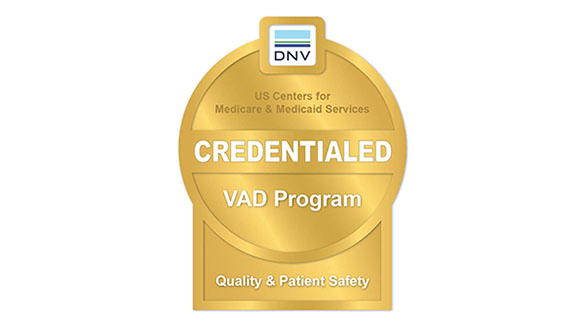Heart Failure
Virtua’s dedicated heart failure specialists use the latest treatments to manage your symptoms and keep you out of the hospital.

Heart failure can leave you tired, out of breath, and unable to enjoy life with friends and family. Virtua’s comprehensive heart failure program will help you manage your condition—from diagnosis and treatment to cardiac rehab and home care.
Signs and Symptoms of Heart Failure
The heart is a muscle that pumps oxygen-rich blood to all parts of the body. Over time, damage from a heart attack, poorly controlled high blood pressure, heart rhythm problems, valve disease, and other issues can cause the heart to weaken or stiffen and work less efficiently.
Common signs of heart failure include:
- Shortness of breath
- Swelling in your legs, feet, or abdomen
- Increased fatigue or tiredness
- Fast, irregular heartbeats
- Persistent cough with white- or pink-tinged mucus
- Rapid weight change
Heart Failure Diagnosis at Virtua
To determine if you have heart failure, your cardiologist will review your medical history and symptoms and perform a physical examination.
Your cardiologist may order additional tests, including:
- Echocardiogram. A type of ultrasound that evaluates your heart function to see how well it is pumping. It will record your ejection fraction (EF), a measure of how much blood is pumped out of the heart with each beat. A normal ejection fraction is 55 to 70%.
- Blood tests. These lab tests can provide more information about fluid in your heart and other body organs.
- Electrocardiogram (ECG). This painless test records the electrical activity in your heart and measures heart rate and rhythm.
- Cardiac catheterization. A minimally invasive procedure that can help determine why the heart is weak and whether it is able to pump enough blood to your vital organs.
- During a left heart catheterization, a small tube is inserted in an artery in your leg or arm and threaded to your heart. A special dye identifies any blockages to blood flow.
- During a right heart catheterization, a small tube is inserted into a vein in your leg or neck and threaded to your heart. The catheter measures the pressures in your heart and lungs and how much blood is being delivered to your body.
- Chest X-ray. Pictures are taken of your lungs and heart. The images show whether there is extra fluid in your lungs and if your heart is larger than it should be.
Heart Failure Treatment at Virtua
Our program ensures people with heart failure know how to manage their condition and have an ongoing source of support and care. We know it’s important for people living with heart failure to remain proactive, so we provide the support you need to stay on top of your health.
Inpatient Care
The Virtua Heart Failure program—recognized by the American Heart Association for applying the most up-to-date, evidence-based treatments to improve outcomes—begins while you're still in the hospital, with comprehensive education for both those who are newly diagnosed and those who are returning, as well as their families. We focus on improving your quality of life and reducing the risk of being readmitted to the hospital.
Our specialists will:
- Start you on medication to improve your heart’s ability to pump blood to the rest of your body
- Help you manage your fluid levels
- Teach you about appropriate diet and lifestyle changes to help you successfully live with heart failure.
If you have advanced heart failure, you may need a left ventricular assist device (LVAD). An LVAD is surgically implanted in the heart and takes over the work of the left ventricle, one of the heart’s two lower chambers. The LVAD helps your heart pump oxygen-rich blood to the rest of the body, lessening the heart’s workload and reducing your symptoms.
An LVAD may be used as a “bridge” until a heart transplant becomes available, or as a longer-term therapy.
Outpatient Care
For outpatient heart failure services, we have five dedicated centers located in Cherry Hill, Moorestown, Washington Township, Willingboro, and Virtua Our Lady of Lourdes Hospital in Camden. Your team of advanced practice nurses, physicians, pharmacists, and dietitians will create an individualized, evidence-based treatment program customized for you, which may include:
- Fluid status review and adjustment adjustment of your diuretics as needed to ensure your levels are in the ideal range
- Adjustment of medications used to treat your heart failure to ensure you are taking the best, most-effective dose
- Management of inotropes, a type of medication used to improve the heart’s ability to pump blood
- Nutritional and lifestyle education
- CardioMEMS™ HF pulmonary artery pressure monitoring
- LifeVest monitoring
- Shared care of left ventricular assist devices
- Cardiac resynchronization therapy
- Connection with community resources, including physical and occupational therapy and cardiology-specific psychiatric counseling
- Participation in clinical research trials
- Palliative care
We provide a home care program utilizing community-based care managers—registered nurses who make home visits.
Program participants also are encouraged to participate in our cardiac rehab program to further help rebuild your strength, increase mobility, and get you back to the activities you enjoy.
We also offer peer support through WomenHeart, a support group led by female facilitators who are heart disease survivors, and who trained at WomenHeart Science and Leadership Symposium at Mayo Clinic.
Virtua Heart Failure Specialists
Whether you come to us or we come to you, our heart failure specialists will manage your symptoms and keep you out of the hospital.
The Virtua Difference for Heart Failure Care
Through close surveillance and adherence to standard-of-care guidance, our program has helped set the mark in heart failure management.
Through close surveillance and adherence to standard-of-care guidance, our program has helped set the mark in heart failure management.
Recognition by U.S. News & World Report and the American Heart Association for excellence in providing the latest, evidence-based heart failure treatments.
Recognition by U.S. News & World Report and the American Heart Association for excellence in providing the latest, evidence-based heart failure treatments.
Our advanced heart failure specialists are specially trained to treat people in every stage of heart failure, including those who need specialized support such as a left ventricular assist device (LVAD).
Our advanced heart failure specialists are specially trained to treat people in every stage of heart failure, including those who need specialized support such as a left ventricular assist device (LVAD).
With dedicated heart failure centers throughout South Jersey, and our home care program, we’re there for you, when and where you need us.
With dedicated heart failure centers throughout South Jersey, and our home care program, we’re there for you, when and where you need us.
Virtua Heart Failure Care Locations
Virtua heart failure specialists are conveniently located in offices across South Jersey.
Make an Appointment
Call for an appointment at one of our convenient heart failure centers.

